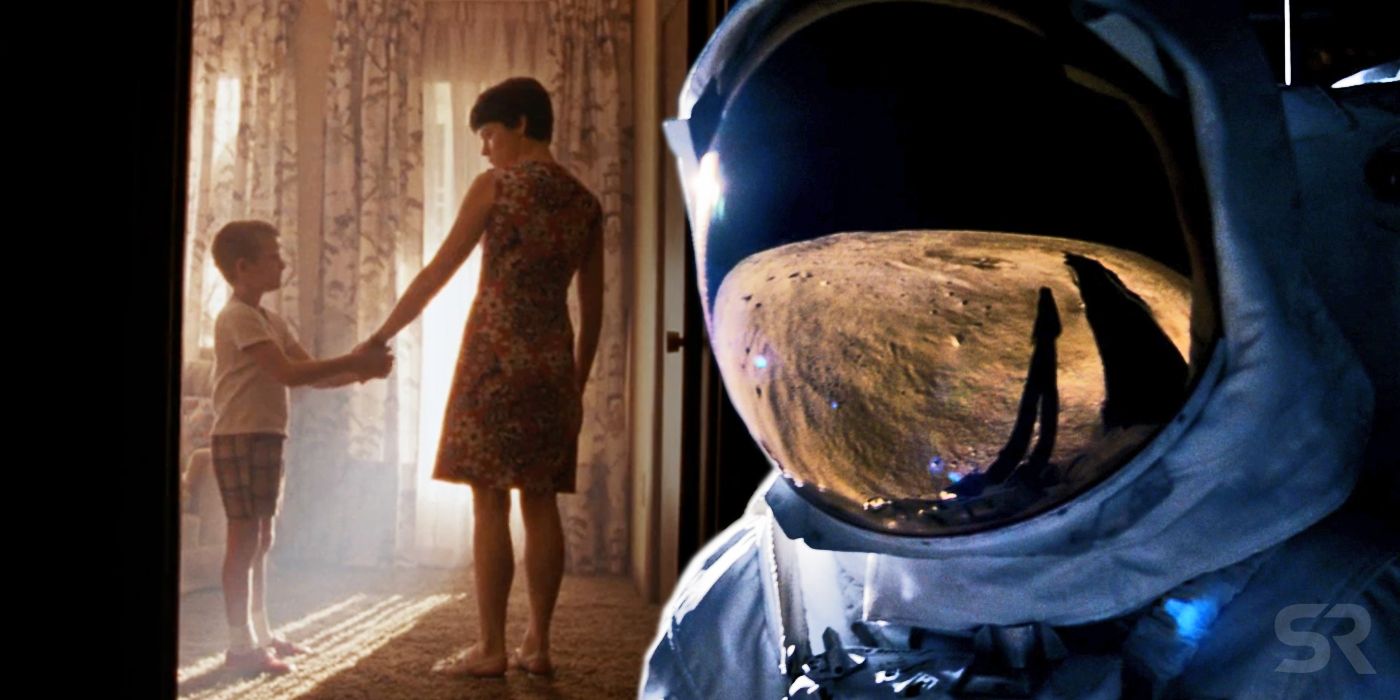
First Man's ending is not what you expect. In fact, First Man as a movie is not what you expect. But its final moments - Neil Armstrong's iconic Moon landing and his bittersweet return to Earth - are most certainly some of its most perplexing.
The latest movie from director Damien Chazelle is, of course, the story of Neil Armstrong, commander of Apollo 11 and the first man on the Moon. We follow Ryan Gosling as Neil and Claire Foy as wife Janet from his early days as a pilot, joining NASA, training and time on the Gemini program - including the near-fatal Gemini 8 mission - all building towards the fate-redefining Apollo 11 mission. But as much as this is a movie about the Space Race, everything about Chazelle's storytelling approach is more about finding the man within the historic achievement for the space agency, America, and all of humanity.
Related: Read Screen Rant's First Man Review
That's what makes the ending of First Man so beguiling. The plot reaches its close in the expected way, yet the story is something far more insular. Here's what First Man's ending really means.
- This Page: First Man's Ending Explained
- Page 2: What First Man's Ending REALLY Means
What Happens At The End Of First Man
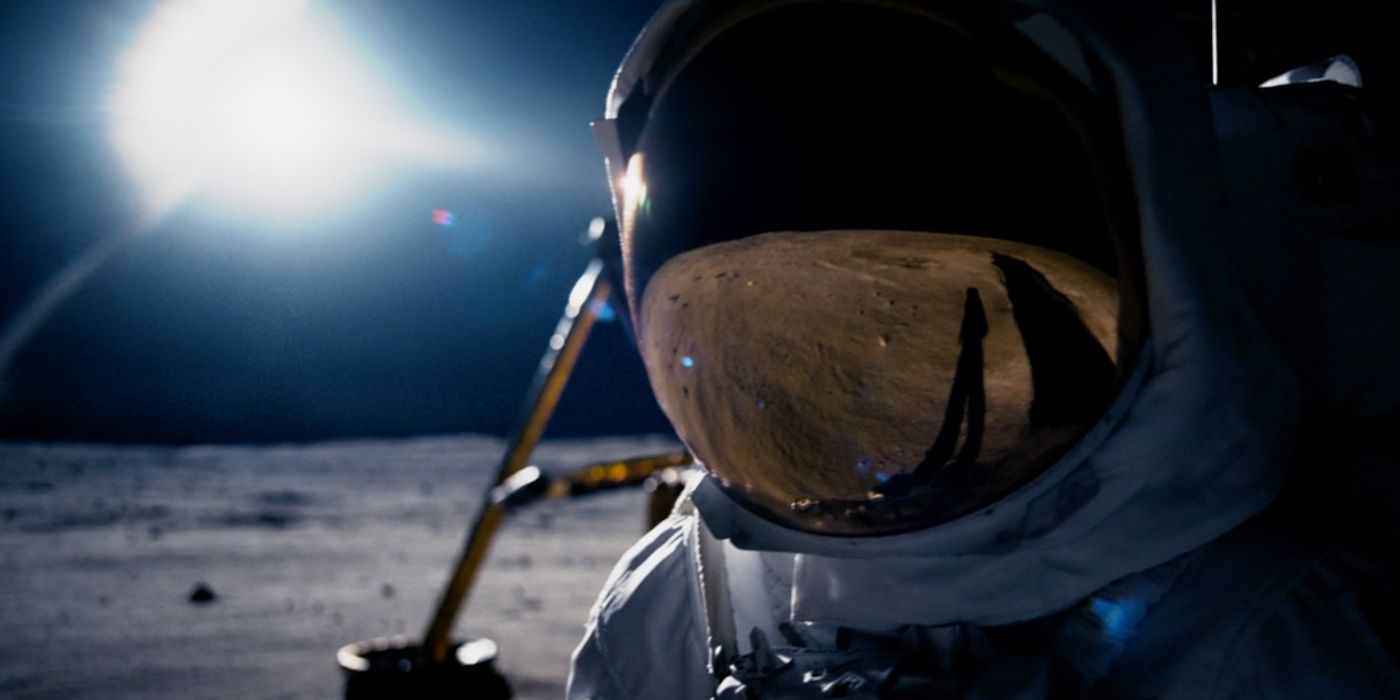
Obviously, the final act of First Man is the Moon landing itself, recreated entirely in-camera to stunning effect. As has been made abundantly clear following the film's festival premiere, though, it's a somewhat skewed take. We see Neil take the small step and make his "giant leap" proclamation, but aside from collecting dirt samples, there's not much of the expected ephemera: needlessly controversial, the US flag is never shown. Instead, the film focuses on Neil's alone time and complete tranquility at the Little West Crater. There, he lifts his vizor and takes in the isolation before dropping his dead daughter Karen's bracelet into the crater.
Back on Earth, Neil and Buzz are put into quarantine - as first men, there's no knowledge of what they could bring back - and the film finally embraces the importance of its events: the duo watch a replay of John F. Kennedy's famous speech vowing to go to the Moon by the end of the 1960s, a fantastical goal they've now achieved.
Finally, in its last scene, First Man returns to just Neil, reuniting him with Janet. They look at each other in silence, awed by the big and small of what's happened, and embrace as best they can: holding hands up against the glass separating them.
First Man Wasn't About The Moon, It Was About Neil Armstrong's Daughter
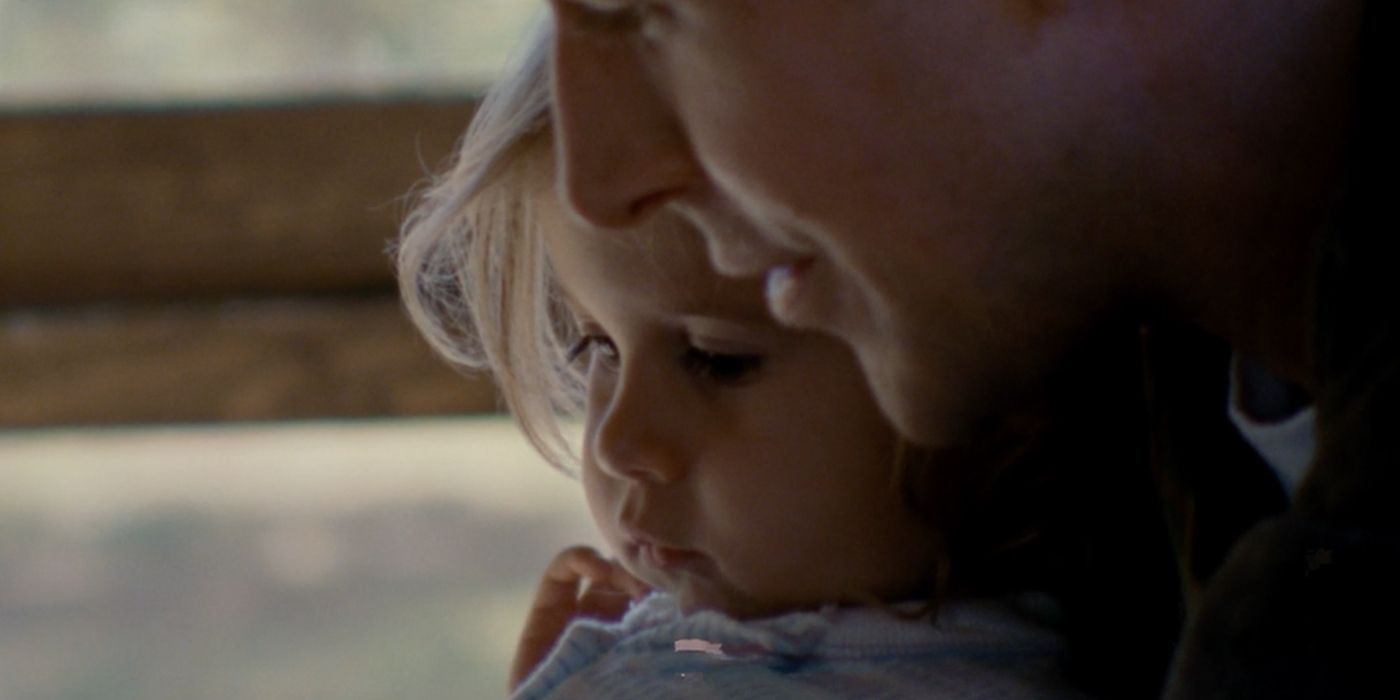
While First Man is ostensibly a biopic, it's a much more intimate and personal character study than most celebrations of real-life figures. Similar to how he made an ode to musicals and the Golden Age of Hollywood only to flip it to be a blunt meditation on modern relationships and success with La La Land, here Damien Chazelle takes the true story of landing on the Moon and hones in on the hidden grief behind Neil Armstrong's drive.
After the opening atmosphere bounce, the film comes to focus not on Armstrong the headstrong pilot but on Neil's relationship with his dying daughter, Karen. Much of the first half is centered on him repressing that grief, cutting off a part of himself from everyone, be they new colleagues or his loyal wife and loving sons. The deep-seated impact of Karen's death in First Man is unavoidable, even as he becomes unilaterally focused on the Apollo mission. Further, First Man heavily implies that it's this aspect that drives Neil, keeping him pushing through missions-gone-wrong and the suffocating weight of expectation - something that lingers mostly in the background of his and the film's perception. Everything about First Man is focused on this, from the internalized shooting style to its Tree of Life free-flowing storytelling.
The masterstroke of Chazelle's approach comes in the Moon landing itself. A marvel of technical filmmaking it may be, the purpose is to serve as a gigantic representation of letting go; literally with the bracelet, but also on a more personal level. In achieving the goal he used as a coping mechanism, a more-alone-than-anyone Neil is finally gifted his introspection and able to accept the unimaginable tragedy.
What The Final Scene Of First Man Means
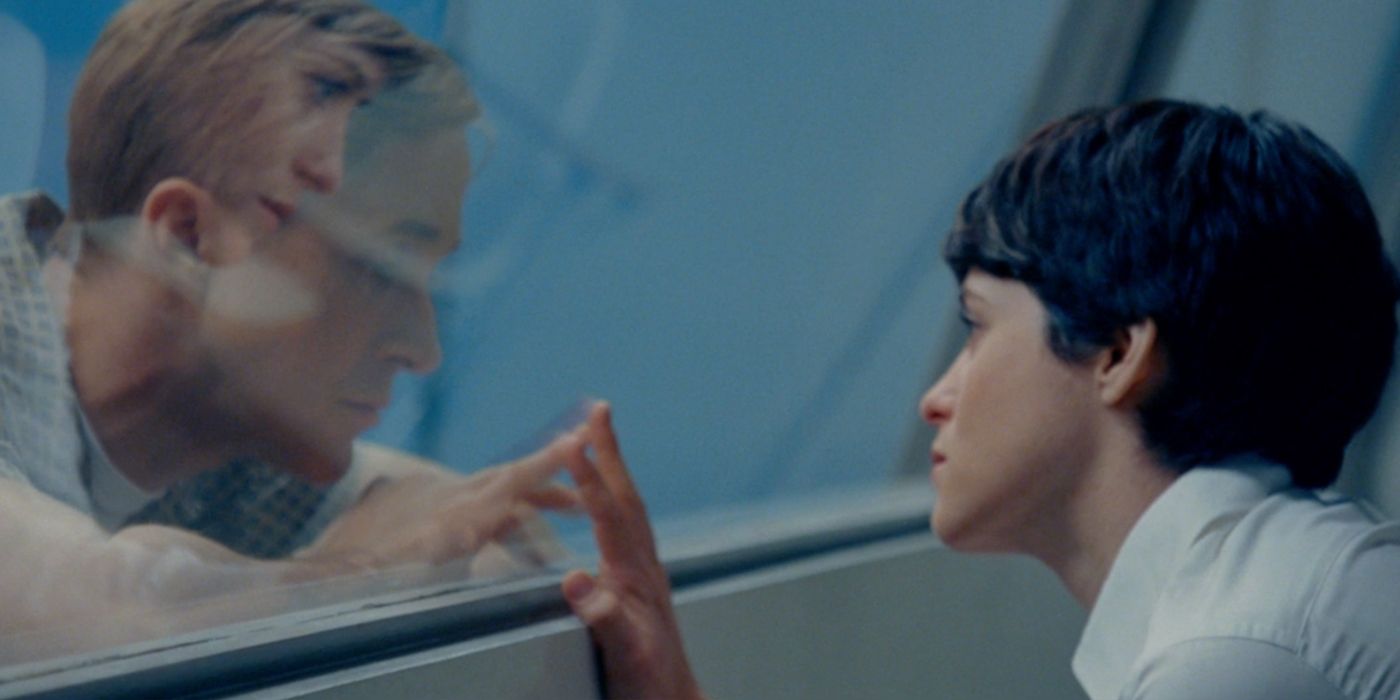
Where Chazelle's subversion of traditional biopic tropes really comes to the fore, though, is in First Man's final scene. Instead of the typical text cards explaining what Neil, Buzz et al did after their mission, we get a lone scene of Neil and Janet reuniting. It's understated, wordless, shot in lingering close takes - and so cathartically moving. He's a man who's gone further than any other, risking his life - hammered home by the unused NASA press release - to achieve an amazing feat. This scene is them reconnecting after being so distanced.
But it's not just the distance of the journey that's being addressed. While Neil's journey has been shown alongside dizzying space theatrics, his relationship with Janet has been one of love over an immense metaphorical distance too. He's never truly opened up about Karen's death, and while nothing is said here, for the first time in the movie there's a sense of true connection. She reaches out to him and he willingly accepts.
Page 2 of 2: The Real Meaning Of First Man's Story
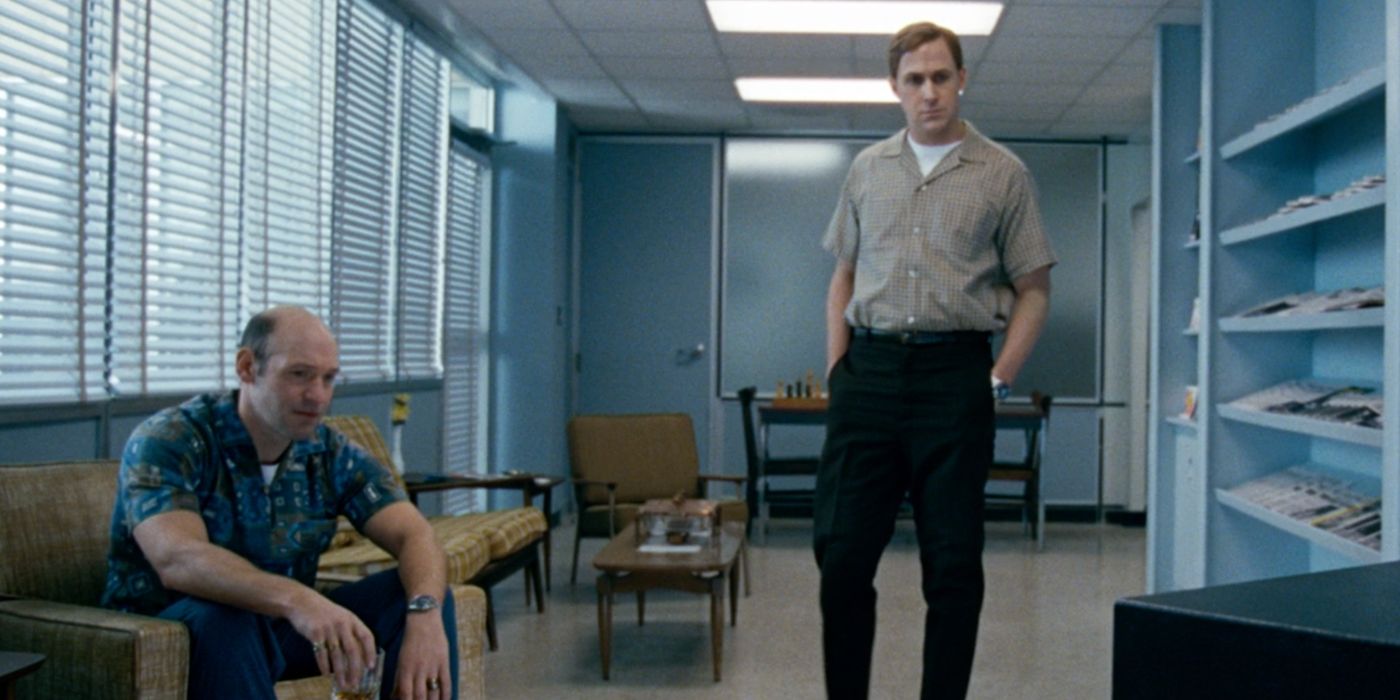
What Happened After The End Of First Man
Of course, for all the emotional catharsis of First Man's ending, this still is a true story and life did continue afterward. What would those ending text cards have said?
Apollo 11 was Neil Armstrong's last mission to space, with him leaving NASA and becoming a lecturer, public speaker and space travel consultant. He stepped away from public life about a decade after the Moon landings. In 1994, he and Janet divorced, with him swiftly remarrying. Neil Armstrong died on August 25, 2012, following heart complications. Janet moved to Utah after their divorce, and died earlier in 2018.
Buzz Aldrin also left NASA shortly after Apollo 11. He struggled with depression and alcoholism following the Moon - hinted at in his final scene of the movie with his stunned taking in of the TV reports - but nevertheless remained a key public presence in space exploration (and wasn't afraid to poke fun at himself, as seen on The Simpsons).
There were six more Apollo missions, all of which successfully landed on the Moon aside from Apollo 13. The programme was canceled in 1972 after Apollo 17 due to the sheer cost, meaning to this day only twelve people have walked on the lunar surface. NASA has, of course, continued the bid for space exploration since, but we haven't been back to the Moon.
The Real Meaning Of First Man's Story
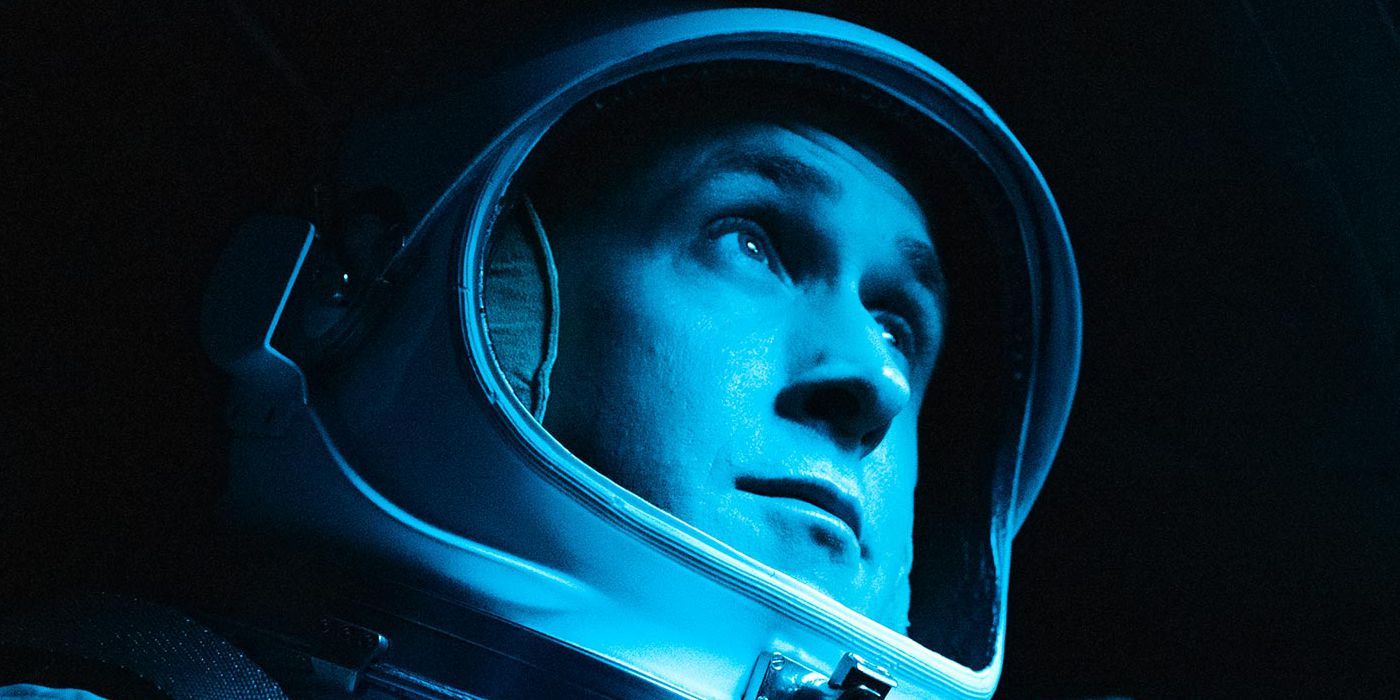
One of the biggest talking points about First Man since its Venice premiere has been the lack of Neil Armstrong and Buzz Aldrin planting the US flag on the Moon. This has led to claims that the movie is unpatriotic at best, rewriting American history at worst. These have been roundly brushed off by those who've seen the film, with most negative takes coming without context from those who hadn't actually seen the movie. However, there is some truth to this reaction - it's just not a bad thing.
First Man takes the Moon landing and makes it an unequivocably humanist victory: both on a personal level and as a species-wide achievement. That it was a US national mission, part of the Space Race, itself a representation of the high-pressure Cold War, is pushed to the background because, on a humanist scale, that not what the story's about. It's not important that this was done for political points and to ensure a former President's words were met: what's important is that we did the impossible (indeed, Armstrong said to President Nixon that it was a victory for "men of peace of all nations"). Whenever First Man addresses the mounting tensions of the Apollo 11 mission, creeping into press conferences and moments of reflection, what weighs on the characters most is the scope of what they're attempting.
In place of the flag waving/planting, we get to learn the intimate story of the man who led the mission, what motivated him and what landing on the Moon meant to him. First Man does shake off some of the national pride surrounding the Moon landing; but it replaces it with something more timeless and relatable.
That is a new take on the story. However, it's one born of coming almost 50 years after the defining event and placing it as a landmark in humanities history. First Man is many things - masterfully directed thrill-ride, dream-like grief exploration - but what is most of all is a cinematic expression of Neil Armstrong's one small step for man.
Next: Neil Armstrong's Sons Respond To First Man's Flag Controversy
from ScreenRant - Feed https://ift.tt/2IUdNUT

0 Comments